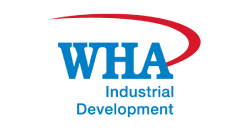記事
Customer Showcase: Yokoyama Kogyo (Thailand) Co., Ltd.- Press and Welding of Seat Frame for Automobiles
02/04/2014YOKOYAMA KOGYO CO., LTD., a Japanese company that specializes in metal press and welding of products for use in automobiles, established YOKOYAMA KOGYO (THAILAND) CO., LTD.-YKT, a wholly-owned subsidiary that is located in the Eastern Seaboard Industrial Estate (Rayong)-ESIE in December 2010. YKT started the production (press and welding of parts) of seat frames at its ESIE factory in February 2012 and now delivers the products to Japanese automobile-related makers.
Mr. Fukuyasu Ujihara, Managing Director of YOKOYAMA KOGYO (THAILAND) is proud of the fact that mass production could start in about one year (usually it takes about two years) because his team prepared product samples for the prompt operation kick-off.
YOKOYAMA KOGYO chose Thailand for its first overseas branch because the company had received a large volume of orders from customers in Japan before setting up shop in Thailand. Furthermore, many Japanese automobile-related makers in Thailand increased the local procurement rates for parts in Thailand, where the global automobile industry has a concentration.
As of March 2013, YKT has six production lines, seven units of press machines, two units of bending machines, fifteen units of welding machines and five units of spot welding machines. Indeed, the factory manufacturers seat frames for the “Mirage”, “Tritron” and “Pajero S” of Mitsubishi Motors as well as for the “Swift” of Suzuki Motors. Currently, the annual production capacity reaches 400 thousand sets (1.2 million units). Moreover, there is a plan to export seat frame parts to Venezuela as knock downs. Together with the assembly of seat frames, the company also welds engine parts for Toyota Motor. Still, YKT has plans to expand its operations by constructing not only seat frames for Japanese and non-Japanese automakers but also other essential car parts.
The company’s capital investment has doubled from 60 million baht (in 2010) to 103 million baht (in 2013). Now there is a plan for new plant and equipment investment in order to facilitate future production growth. Specifically, operations will specialize on pressing. The goal is for the facility to be completed in November this year, and for the press machines to be installed in 2014.
Mr. Kazuhiko Fujii, the Factory Manager, is confident in the quality and prices of the company’s products, and speed of delivery. YKT introduced a Kanban System that “keeps stock as less as possible and makes as much as they can sell” to the ESIE factory. He stated that he places orders so as not to cause inventory shortages but, at the same time, it’s important to control the stock as much as possible for smooth production as well as better utilization of factory space.
The biggest challenge in Thailand is labor management, such as the availability of an adequate human resource pool, not the production itself. Currently, there are about 160 Thai employees at the ESIE factory, and it is necessary to develop veteran employees to maintain continuity with the QCD (quality, cost and delivery) of the company’s products. Initially, Japanese staff was confused with the way of thinking, customs and nature of the Thai people. However, Mr. Ujihara points out that he is proud that the turnover rate at YKT last year was less than 1%, which reflexes the company’s good retention program. With the expansion of the production lines and the increasing number of new employees, Mr. Ujihara put a lot of effort to make a homely work place and tries to gain a good understanding of employees with employees’ point of view through a good communication.
In fact, Japanese management aims to create a comfortable working environment for Thai personnel and one that would achieve a balance between harmony and productivity. Only two Japanese managers are ever present at the factory, but occasionally some other management-level personnel are sent for short assignments from corporate headquarters in Japan, and they prove to be helpful in both training and administration. At YKT management is attempting to build a company that Thai employees can connect to and feel that “they are happy to work for YKT” and that “they want to work hard for YKT”. Such a positive sentiments result in improved productivity. Furthermore, it is said that this type of constructive thinking was promoted not only by the former president but also advanced by the current president and vice president.
The reason why YKT selected the Eastern Seaboard Industrial Estate (Rayong) was because there is a large concentration of automobile-related makers. Seat frames cannot be delivered in bulk at once because they are large items, so trucks have to go back and forth between the factory and customers many times within a single day. But Mr. Fujii commented that the advantage of the location is that “we can deliver products 18 times per day because the biggest customer is in the same Industrial Estate, and we can reduce transportation charges and shorten the transportation time”.
Mr. Ujihara adds that “it is very reassuring that there is a coordinator at Hemaraj who is fluent in Japanese and someone we can trust just in case. For example, she advices us properly, even if we ask about the construction law”. He is also impressed with the good infrastructure within the industrial estate.
In 2012 Thailand hit the two million mark regarding the production of automobiles in one year for the first time ever. The target now has been set at three million units by 2017, so automotive production is expected to expand more. For Mr. Ujihara, who has a high opinion of Thai employees at YKT in sustaining a stable and efficient production system, his dream seeks to “develop new customers of press parts, especially Japanese automotive-related companies” to achieve the next three million units.
Remarks: The article was written for Hemaraj Newsletter April 2014 Vol. 30 No. 1.

